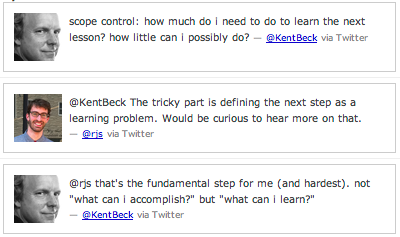
I love this about Kent Beck’s approach. Each step in a design removes uncertainty. Each step is a question of how to learn something you didn’t know before in order to move forward. That’s a totally different way of looking at it versus “What’s my next to-do?”

Matt
on 12 Jul 11really enjoy this. a thought provoking way to think about iterative design.
Rob Colburn
on 13 Jul 11@AC. It’s missing a bit of context right?
—For those who already understand. TL;DR
Say, you’re working on the design for something like “High Rise Contacts”, you’ve got an idea on loves and hates. Where do you go next?
Kent’s Perspective: First, define scope the what you’re doing by asking yourself “how much do i need to do learn the next lesson? how little can i possibly do?” Another words, each iterative design is a learning experience. Just do enough, so that you can test if the concept.
Mike Surel
on 13 Jul 11I think the “approach” is thought provoking like horoscopes. It is beautifully vague and allows every reader to bring their own experience to it and fill in a LOT of blanks. It’s not an approach so much as something you might find inside of a fortune cookie.
I’ve seen many, many illogical outcomes that were arrived at one logical step at a time.
Matt
on 13 Jul 11@Mike – I think the idea of redefining the problem from ‘what do we need to build’ to ‘what do we need to learn’ is more concrete that you give it credit for. Since an large part of an iterative approach is about learning constraints and requirements anyway, this redefinition that is being communicated has some merit.
Anonymous Coward
on 13 Jul 11Not everything written by Kent Beck is worth quoting.
EH
on 13 Jul 11There’s a danger of reinventing wheels in his approach. NIH syndrome applied to one’s own brain and/or tasklist.
Andrew
on 17 Jul 11Err, OK? I think.
This discussion is closed.